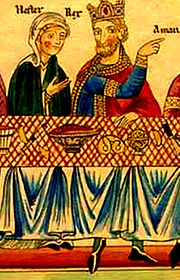You are using an out of date browser. It may not display this or other websites correctly.
You should upgrade or use an alternative browser.
You should upgrade or use an alternative browser.
Can snowboarders pretzell
- Thread starter Tanner-D
- Start date
dodgeridge*rider
Active member
probaly in think thank movies
ThaLetterM.
Active member
History of the pretzel


An illustration from the 12th century Hortus deliciarum from Alsace may be the earliest depiction of a pretzel, shown at a banquet with Queen Esther and King Ahasuerus
Sources differ as to the time and place of the pretzel's origin. Its use in the emblems of bakers in Southern Germany at least since 1111 is documented. The 12th century Hortus Deliciarum from the Southwest German (now French) Alsace may be the earliest depiction of a pretzel. It remains very popular in Southern German regions of Swabia and Bavaria where it is known as Brezl and Brezn, respectively. In northern Germany, where it is less popular, it is known as Brezel.
The History of Science and Technology, by Ronnie Smith and
Alexander Hellemans, says that in 610 A.D. "...[a]n Italian monk
invents pretzels as a reward to children who learn their prayers. He
calls the strips of baked dough, folded to resemble arms crossing the
chest, 'pretiola' ("little reward")", however no source, primary or
otherwise, is cited to back up this detailed specificity.[citation needed] Other sources derive the name from Latin 'bracellus (a medieval term for "bracelet"),[1] or 'bracchiola ("little arms") (more apparent from Spanish brazo "arm") combined with the southern German dialect diminutive ending -le (or -el).


An illustration from the 12th century Hortus deliciarum from Alsace may be the earliest depiction of a pretzel, shown at a banquet with Queen Esther and King Ahasuerus
Sources differ as to the time and place of the pretzel's origin. Its use in the emblems of bakers in Southern Germany at least since 1111 is documented. The 12th century Hortus Deliciarum from the Southwest German (now French) Alsace may be the earliest depiction of a pretzel. It remains very popular in Southern German regions of Swabia and Bavaria where it is known as Brezl and Brezn, respectively. In northern Germany, where it is less popular, it is known as Brezel.
The History of Science and Technology, by Ronnie Smith and
Alexander Hellemans, says that in 610 A.D. "...[a]n Italian monk
invents pretzels as a reward to children who learn their prayers. He
calls the strips of baked dough, folded to resemble arms crossing the
chest, 'pretiola' ("little reward
otherwise, is cited to back up this detailed specificity.[citation needed] Other sources derive the name from Latin 'bracellus (a medieval term for "bracelet"),[1] or 'bracchiola ("little arms") (more apparent from Spanish brazo "arm") combined with the southern German dialect diminutive ending -le (or -el).
drippynuts
Member
how teh fuck do they pretzel. break the board in half, switch up, stick the board together, then break it half,, grip, switchup?
wtf. snowboarders fucking cant, fuck them.
wtf. snowboarders fucking cant, fuck them.
ThaLetterM.
Active member
muhahaha
thizznnskiin
New member
haha of course they can
TheMoostafian
Active member
omg whats a pretzel??
nkinsman10
Active member
i love pretzels, but i thought the whole world was allowed to eat them, and i didnt know that their snacky goodness was only available for skiers to enjoy